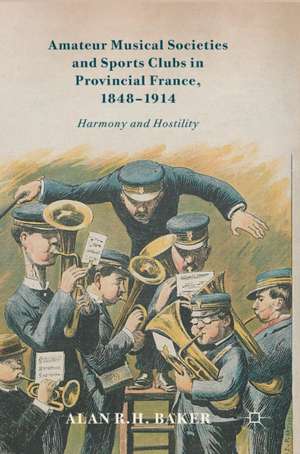Amateur Musical Societies and Sports Clubs in Provincial France, 1848-1914: Harmony and Hostility
Autor Alan R. H. Bakeren Limba Engleză Hardback – 2 oct 2017
| Toate formatele și edițiile | Preț | Express |
|---|---|---|
| Paperback (1) | 530.37 lei 38-44 zile | |
| Springer International Publishing – 10 aug 2018 | 530.37 lei 38-44 zile | |
| Hardback (1) | 595.54 lei 6-8 săpt. | |
| Springer International Publishing – 2 oct 2017 | 595.54 lei 6-8 săpt. |
Preț: 595.54 lei
Preț vechi: 700.63 lei
-15% Nou
Puncte Express: 893
Preț estimativ în valută:
113.96€ • 119.28$ • 94.85£
113.96€ • 119.28$ • 94.85£
Carte tipărită la comandă
Livrare economică 31 martie-14 aprilie
Preluare comenzi: 021 569.72.76
Specificații
ISBN-13: 9783319579924
ISBN-10: 3319579924
Pagini: 226
Ilustrații: XI, 350 p. 15 illus., 11 illus. in color.
Dimensiuni: 148 x 210 x 28 mm
Greutate: 0.74 kg
Ediția:1st ed. 2017
Editura: Springer International Publishing
Colecția Palgrave Macmillan
Locul publicării:Cham, Switzerland
ISBN-10: 3319579924
Pagini: 226
Ilustrații: XI, 350 p. 15 illus., 11 illus. in color.
Dimensiuni: 148 x 210 x 28 mm
Greutate: 0.74 kg
Ediția:1st ed. 2017
Editura: Springer International Publishing
Colecția Palgrave Macmillan
Locul publicării:Cham, Switzerland
Cuprins
1. Sociability and fraternity.- 2. Musical societies.- 3. Sports clubs.- 4. Conclusion and conjectures.- Bibliography.- Index.
Recenzii
“This book provides an important glimpse into the shifting landscape of sociability and identity during a formative moment of the French national narrative and underscores the huge role of associations in the development of republican values.” (Corry Cropper, Journal of European Studies, Vol. 48 (02), June, 2018)
Notă biografică
Alan Baker is a Life Fellow of Emmanuel College, University of Cambridge, UK.
Textul de pe ultima copertă
This book explores leisure-related voluntary associations in France during the nineteenth century as practical expressions of the Revolutionary concept of fraternité. Using a mass of unpublished and hitherto unused sources in provincial and national archives, it analyses the history, geography and cultural significance of amateur musical societies and sports clubs in eleven départements of France between 1848 and 1914. Original research is set within the context of published historical studies of sociability in France as a whole. It demonstrates that, although these voluntary associations drew upon and extended the traditional concept of cooperation and community, and the Revolutionary concept of fraternity, they also incorporated the fundamental characteristics of competition and conflict. Although intended to produce social harmony, in practice they reflected the ideological hostilities and cultural tensions that permeated French society in the nineteenth century.
Caracteristici
Examines how fraternité was expressed through Amateur Musical Societies and Sports Clubs in France Offers extensive original research, using unpublished archives from eleven different regions Reveals how not only cooperation, but also competition and hostility, characterised these societies and clubs
